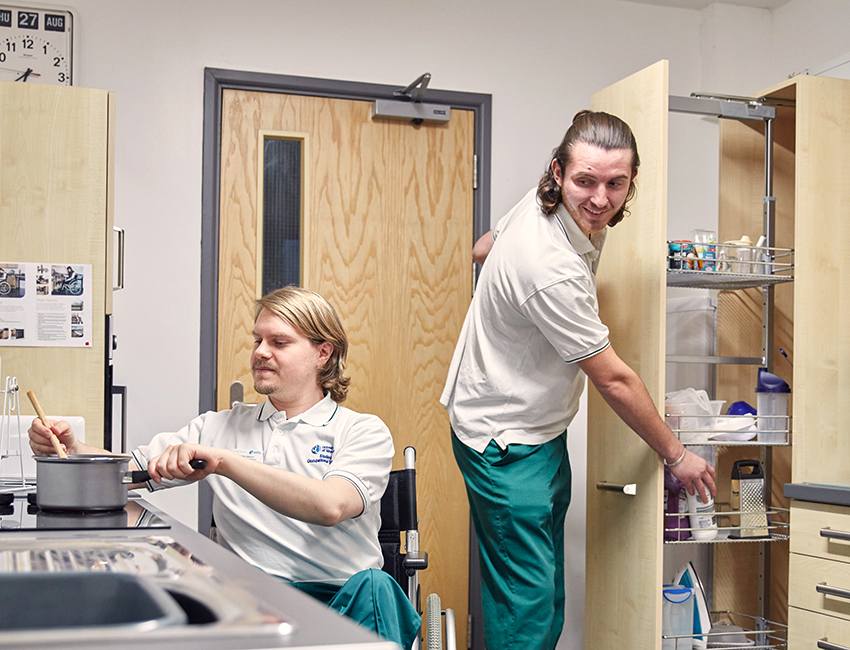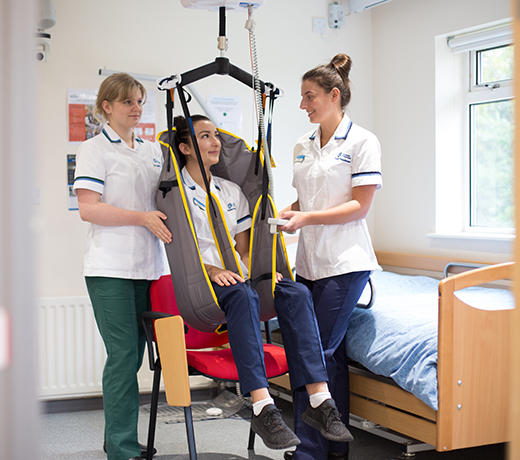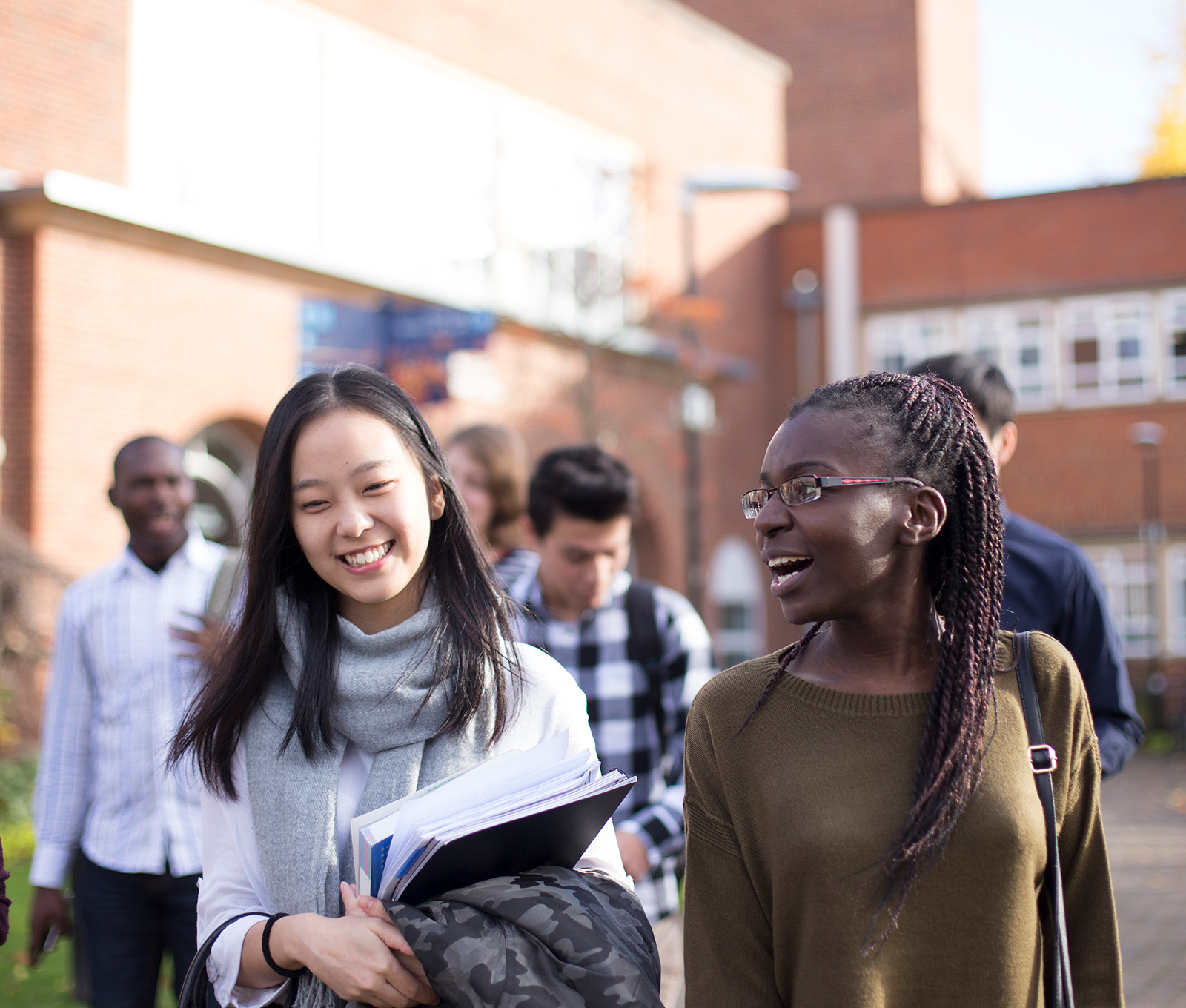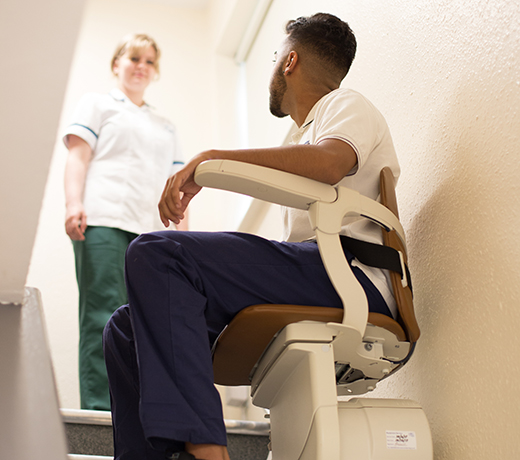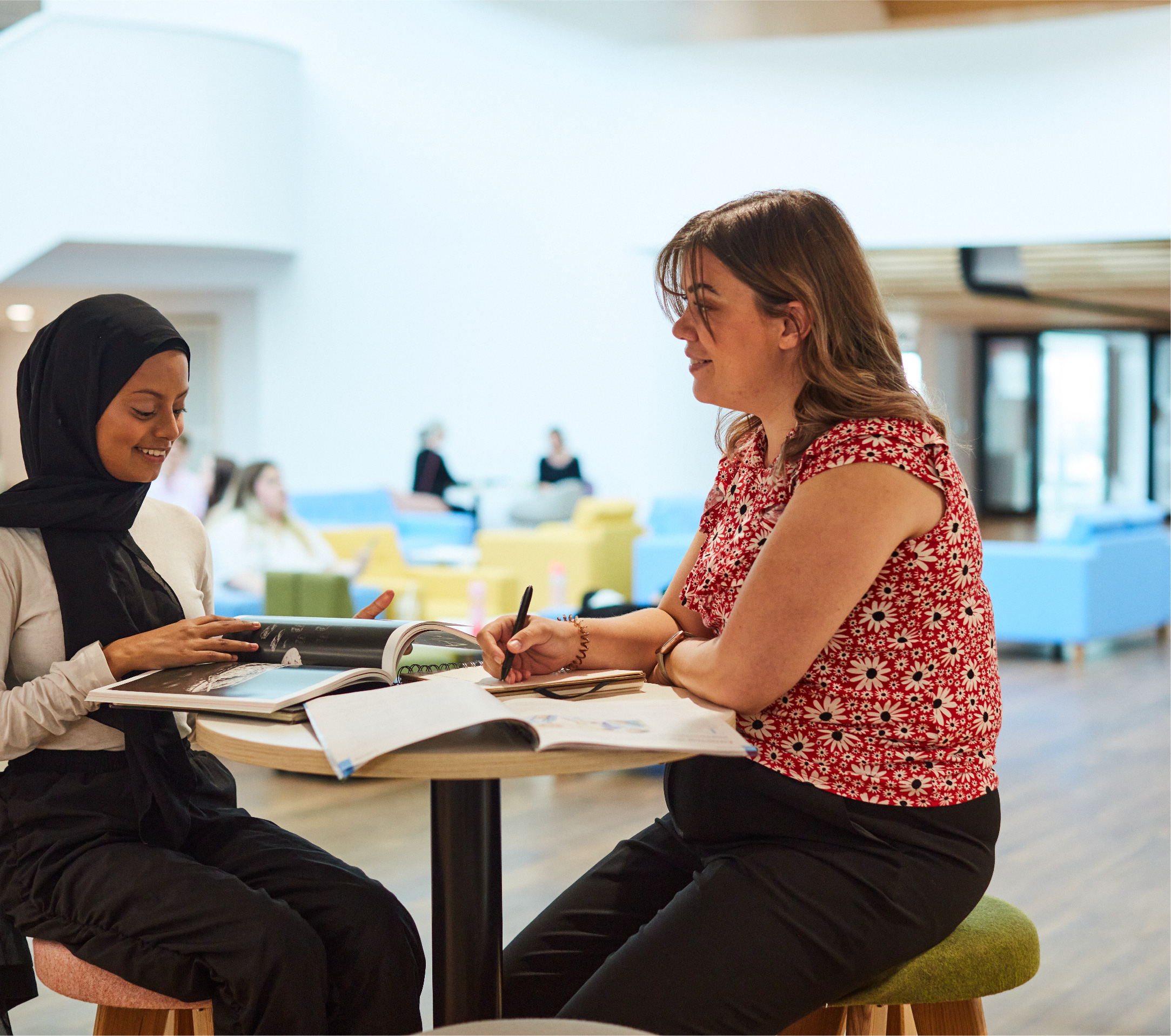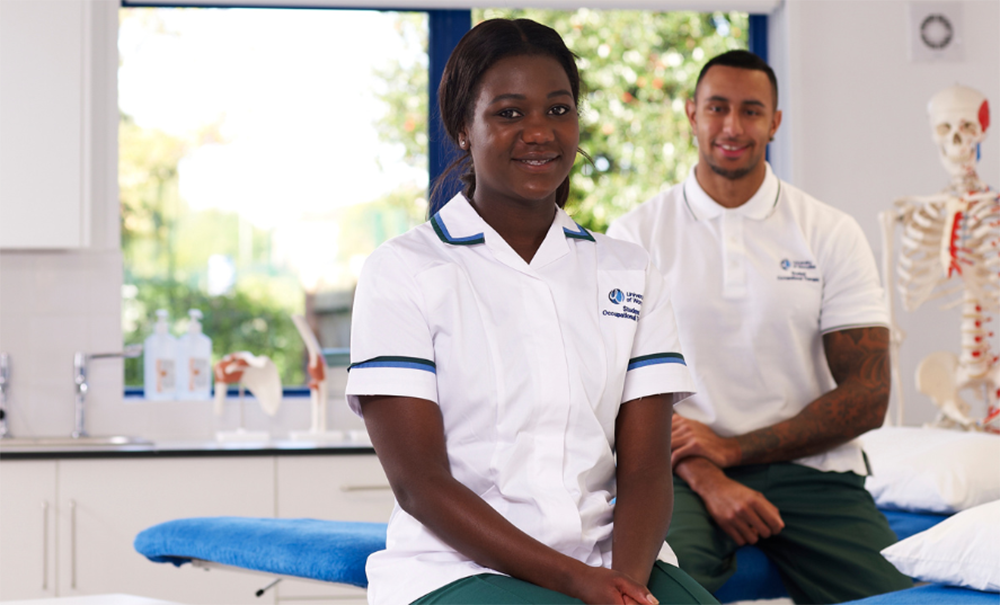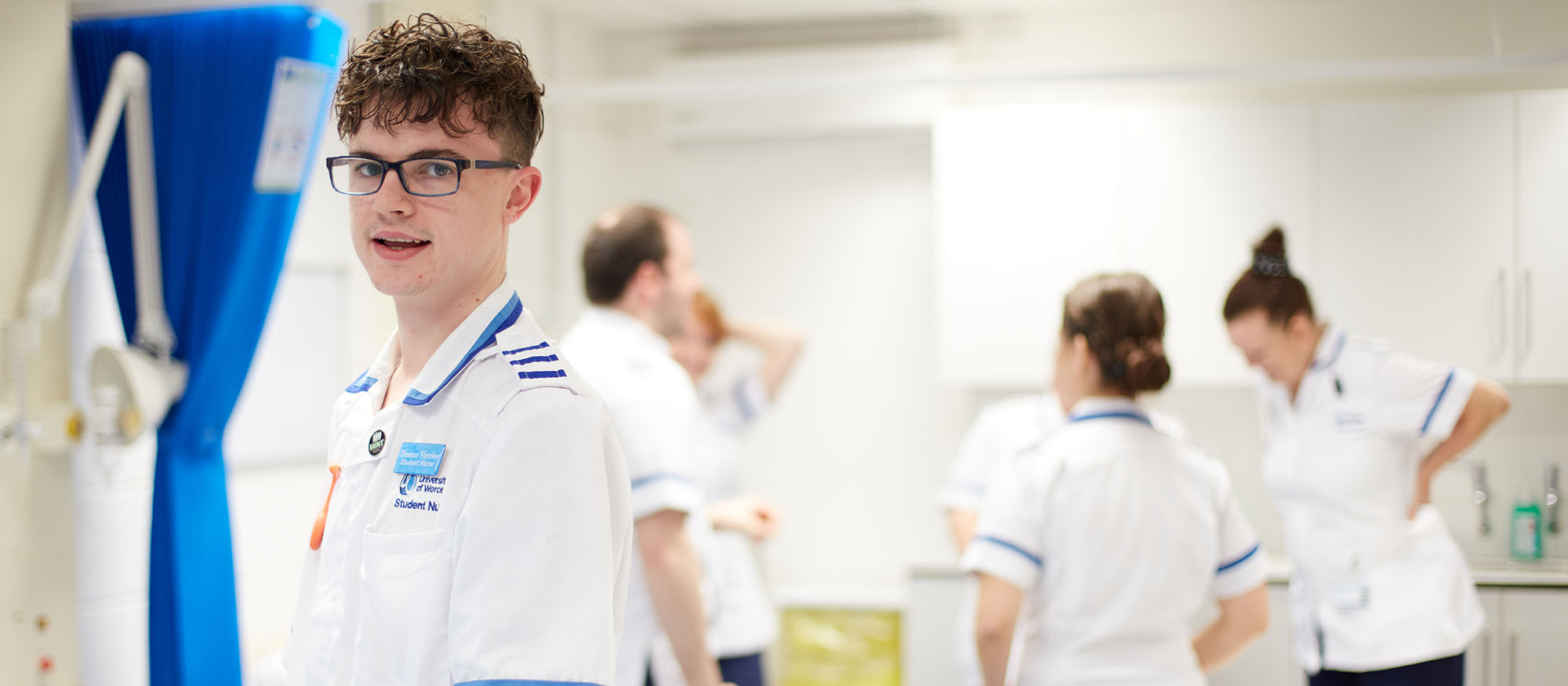At Worcester, you'll be taught by qualified occupational therapists and will spend at least 1,000 hours on professional placements. You'll get ready for practice in our specialist skills simulation facilities and a specially converted house, with adapted kitchens, bathrooms and bedrooms.
grant that you won't need to pay back
for student satisfaction
This means that when you graduate, you can register with the HCPC to practice under the protected title of occupational therapist.
Overview
As an occupational therapist, you'll work collaboratively with people who have difficulties carrying out day-to-day occupations (activities). This may be due to physical or mental health difficulties, learning differences, age related changes, transitions in life (for example becoming a parent or moving into retirement), trauma (whether physical or emotional), social circumstance or an intersection of many different things.
This might involve making changes to the environment in which people carry out their occupations, working with someone who is learning new ways to do things or working through a recovery process where someone is able to return to previous occupations or discover new and different occupations.
As well as working with individuals, their families and other people that are important in their lives, you could also work with people in groups. You may work as the only occupational therapist in an area, or as part of a team. You may work in people’s own homes, hospital settings, social services departments, charity organisations, prisons, schools, and many other areas. You’ll work with people of all ages so that they can achieve the occupations they need and want to be able to do to live fulfilled lives.
This course has a strong practical focus and you’ll spend a lot of time out on work placements in a variety of settings. When on campus, you’ll be taught through a mix of lectures, interactive seminars, and practical skills sessions. You’ll also have access to Ability House – a converted house with specialist adaptations made to the kitchen, bathroom, and bedrooms where you can practice your skills.
An employability module in your final year will develop your interview skills, explore available job roles, and support you in completing applications.
At Worcester, you’ll be taught alongside other health and social care students, including physiotherapists, dietitians, social workers, mental health nurses, physicians associates, and doctors. This prepares you to collaborate with and work alongside other health and social care professionals, just as you will once you graduate.
Placements
By the end of this course, you’ll have built up at least 1,000 hours of professional experience. Our dedicated therapy placement team organise this for you, giving you a range of different experiences throughout the course.
Recent placements have included occupational therapy roles in:
- NHS and private hospitals
- Care farms
- Adult social care
- Community mental health or learning disability teams
- Residential mental health facilities
- Postural case services
- Woodland therapy settings
- Community rehabilitation teams
- Schools, both mainstream and specialist
- Charities and businesses
- Specialist equipment suppliers and services
- Project and research based placements
What is occupational therapy?
Course content
On this accredited course you’ll study theories backed up by substantial evidence and will then apply this learning in professional practice.
Throughout the course you’ll gain a broad range of experience in the field, with experienced occupational therapists supervising you as you complete 1,000 hours of placement in different therapeutic settings.
All modules are mandatory to ensure you’re eligible to register as an occupational therapist with the HCPC.
We regularly review our courses to reflect the latest research and developments in the subject area, as well as feedback from students, employers and the wider sector. As a result, modules may change to ensure the course remains current and relevant.
Careers
Most of our graduates become registered occupational therapists.
As an Occupational Therapist you can work in a huge variety of settings, including:
- NHS and private hospitals
- Schools
- Adult social care settings
- Mental health, learning disability and postural care services
- Outdoor therapy centres
- Specialist equipment suppliers and home adaptation services
- In people’s homes and the community
As occupational therapists, we do not group people by health condition or speciality but address their needs as individuals. Most of our graduates secure their preferred first choice of employment area, and whilst many choose to work within the NHS or social care, others have taken new graduate roles within charities and private health settings.
Our course is recognised by the World Federation of Occupational Therapists, meaning you can also choose to seek employment as an occupational therapist abroad.
Course highlights
Teaching and assessment
Teaching is a mix of interactive seminars, lectures, one-to-one tutorials and practical skills sessions. Your assessments will help prepare you for a career as an occupational therapist, and include writing reflective essays, engaging in group debates, creating a health promotion plan and designing a training package.
Teaching and assessment contents
The BSc (Hons) Occupational Therapy course is delivered in a variety of ways. These include lectures to whole cohorts, where an overview of the subject is covered by a lecturer with knowledge and experience in the topic; small group seminars which facilitate engagement with the subject and requiring discussion and further research. A wide variety of practical skills sessions are also used. For example, teaching you how to use specialist equipment, practicing assessment skills and facilitating intervention strategies. These sessions are carried out in groups, sometimes inter-professionally. This multifaceted approach to constructing knowledge and building your understanding can be further embedded through meetings with personal academic tutors where you can discuss your learning, receive support with assessment planning and interpreting and applying previously received feedback. Collaborating with peers is another way in which you are supported to develop your skills of analysis and structuring constructive feedback.
All campus-based learning is supported by and linked to the learning which takes place on practice placements. On this course, you will undertake over 1000 hours of successfully completed assessed practice education across 4 placements. You will be placed in four different practice environments, including one non-traditional setting, to ensure breadth of experience to enhance learning.
The University places emphasis on enabling students to develop the independent learning capabilities that will equip them for lifelong learning and future employment, as well as academic achievement. A mixture of independent study, teaching and academic support from Student Services and Library Services, and also the personal academic tutoring system enables students to reflect on progress and build up a profile of skills, achievements and experiences that will help them to flourish and be successful. Students also experience a wide range of different learning platforms such as Blackboard, Turnitin, Vevox, MS Teams and a variety of other digital resources that continue to develop year on year. This reflects the fact that students will increasingly be using a wide range of digital resources in practice and may be involved in implementing in the future.
Entry requirements
UCAS tariff points required: 120
| Qualification | Grade |
|---|---|
| A-level | BBB (excluding General Studies) |
| BTEC National Extended Diploma | DDM |
| T-level | Merit - Education and Childcare, Health, Healthcare Sciences or Science |
We do accept Access to HE Diplomas and other qualifications which may not exactly match the combinations above. Work out your estimated points with the UCAS tariff calculator.
Any questions?
If you have any questions about entry requirements, please call our Admissions Office on 01905 855111 or email admissions@worc.ac.uk.
Fees
Fees contents
UK and EU students
In 2026/27 the standard fee for full-time home and EU undergraduate students on BA/BSc/LLB degrees and FdA/FdSc degrees is £9,790 per year.
Tuition fees are reviewed annually and may increase each year for both new and continuing students.
For more details on course fees, please visit our course fees page.
International students
In 2026/27 the standard tuition fee for full-time international students enrolling on BA/BSc/LLB degrees and FdA/FdSc degrees is £17,200 per year.
Tuition fees are reviewed annually and may increase each year for both new and continuing students.
For more details on course fees, please visit our course fees page.
Contact
If you have any questions, please get in touch. We're here to help you every step of the way.

Admissions Office
admissions@worc.ac.uk01905 855111More to explore
Open Days
Visiting us is the best way to get a feel for student life at the University of Worcester.

The City of Worcester
Worcester is a welcoming university city with great transport links and plenty of student parking.

Accommodation
Benefit from our accommodation guarantee. We have rooms on campus to suit every budget including en-suite options.

